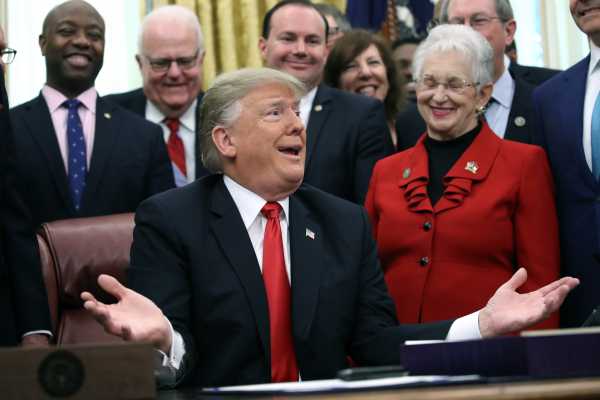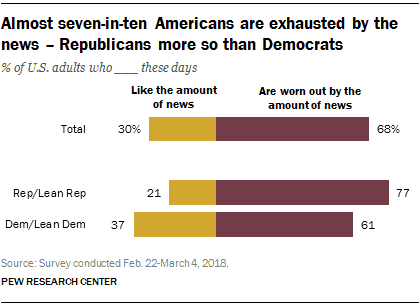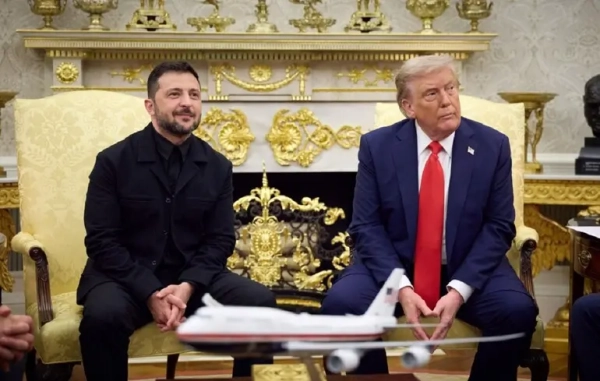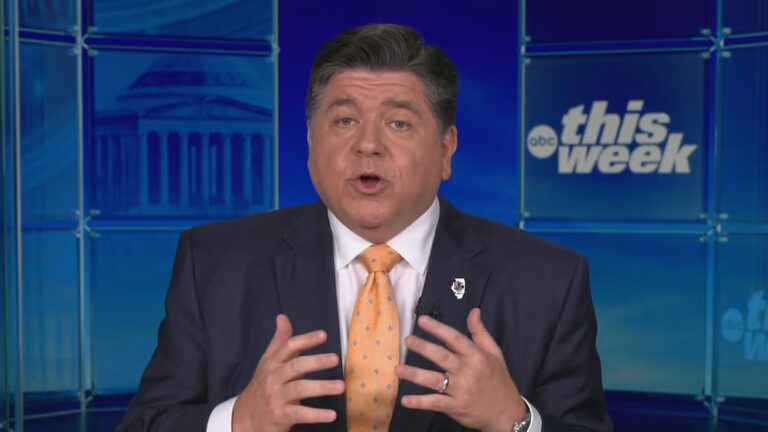
The federal government — or some of it, anyway — is on the verge of shutting down again at 12:01 am Saturday, so the time has come again to play the blame game.
But while it’s conventional political wisdom that one party or the other will pay the price when the government shuts down, it doesn’t actually seem to work that way.
Shutdowns are a game of chicken, and everybody is looking for leverage. If the public blames your opposition for obstructing the proper functioning of the government, your opponent might eventually break and come to the table to negotiate.
So Trump, despite seeming eager just a few days earlier to take credit for a shutdown and precipitating the crisis by threatening to veto a spending bill, is pointing his finger at the Democrats. Democrats are pointing out that Congress had more or less reached a deal to fund the government into February, and then Trump tore it up with his veto threat. It sure sounds like the president is shutting down the government, and let’s not forget he just got done saying that was what he wanted to do.
But the lesson of the last few shutdowns is that nobody really seems to win or lose anymore and therefore any leverage is a mirage. We’re now on our third shutdown of the year and fourth of the decade. Voters have short memories. Republicans shut down the government in 2013, and voters rewarded them with a Senate majority the next year. Democrats tried it this year and got a House majority for their troubles.
The fact that Washington is seemingly in a state of perpetual crisis under Trump means week’s drama has been robbed of some of its potency. The government has gotten so good at shutting down that there are now have contingency plans that keep much of it open.
“Few people feel an impact from it in their own lives,” Molly Murphy, a Democratic pollster, told me. “They think it reflects Washington’s dysfunction, which they loathe, but it is still too distant from what hits home.”
Government shutdowns are almost routine now
Trump has been hankering for another shutdown ever since the last one ended.
He said back in July he would be willing to shut down the government to force the Democrats’ hands on border security. He said it again in November, then a week ago said he’d be “proud” to shut it all down, and repeated one more time for good measure that he was prepared for a “long” shutdown to get the border wall money he wants.
You’d forgive the president for thinking government shutdowns are just the normal way of doing business. The government shut down for three days back in January when Democrats tried to force Republicans to make a deal to take care of DACA recipients.
Then it shut down again a few weeks later, for just a couple hours, because Sen. Rand Paul (R-KY) wasn’t happy with how much government spending Republican majorities were about to approve.
Under President Barack Obama, every spending deadline seemed to require at least a momentary crisis. The federal government shut down for nearly three weeks back in 2013, as Republicans tried to force Obama to defund his own health care law — a shutdown that took a real material toll on the economy.
This is just the way Washington works. Impending deadlines are the best motivators to compel Congress to act, so lawmakers see any crisis as an opportunity to get their policy priorities accomplished. So we’re back here again.
Voters don’t punish parties for government shutdowns
One chart probably explains why Americans aren’t going to hold anybody accountable for a government shutdown: They are feeling too fatigued to notice or remember it.

The historical record is pretty persuasive at this point: Voters don’t hold grudges against the party that shut down the government.
Republicans owned the shutdown in 2013; Sen. Ted Cruz (R-TX) made himself famous for reading Green Eggs and Ham from the Senate floor while urging the Democratic majority to defund their signature health care law. Polling at the time found more than 60 percent of the public disapproved of how the GOP was handling the shutdown.
In November 2014, Republicans won 13 House seats and, more importantly, nine Senate seats to take a majority in the upper chamber and assume full control of Congress.
During this year’s earlier multi-day shutdown, voters blamed Democrats and Trump in almost equal measure. The punishment for Democrats was winning 40 House seats and sweeping back into power in Congress on a blue wave.
Surveys already show that people would blame Trump and Republicans for a shutdown now. But there is just little reason to think at this point that there will be any meaningful political aftershocks for the upcoming shutdown. For one thing, it will be a long time until voters go back to the polls. Many of the members of Congress who will be up for election in 2020 aren’t even in office yet. So much could happen before then.
“Their memories are fleeting,” Murphy said of voters. “Not just with shutdowns but with a lot of stuff.”
We don’t even really “shut down” the government anyway
After a couple of government shutdowns in the 1990s, Congress realized that they really didn’t want the entire government to shut down if they came to a funding impasse. So they started identifying certain essential services that would keep running even in the event that lawmakers let funding authority lapsed. So the federal government doesn’t even shut down when we have a government shutdown.
But making the current standoff even more absurd is the fact that Congress actually has approved new spending, in prior legislation, for much of the government’s functions. If the government does close on Friday night, the emphasis should be on what a partial shutdown it actually is.
As Vox’s Li Zhou already reported, three-fourths of the government is already funded. For all the pomp and drama around the upcoming shutdown, it’s not much of one at all. These are some of the services that will still be operating tomorrow no matter what happens between Trump and Congress:
- Social Security, Medicare, and Medicaid
- US Postal Service
- Veterans health care
- Food stamps
- The military
- Robert Mueller’s special counsel investigation
- Air traffic control
- The courts
That’s a whole lot of government. These are the services that might actually want to close if Congress doesn’t approve a new spending bill:
- National parks
- The IRS
- Environmental and food inspectors
I don’t want to minimize the inconvenience for families who think they’re going to go for a Christmas hike or the workers whose pay might be interrupted right around the holidays. But the government, as most Americans understand and experience it, will still be running tomorrow, whatever the headlines might say.
So you’re free, as Trump and Democrats in Congress surely will, to point fingers. But at this point, most Americans don’t have much reason to take notice.
Sourse: vox.com






